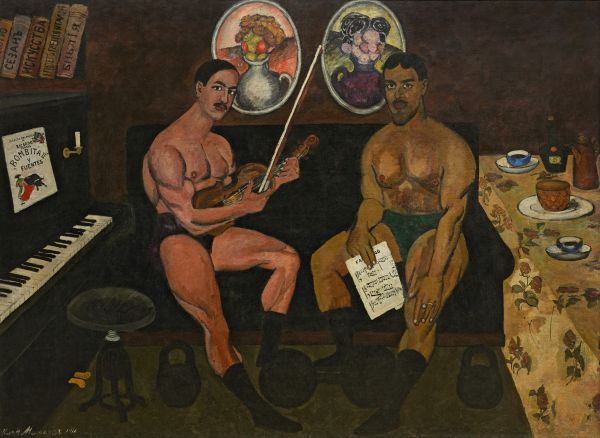|
|
Self-Portrait and Portrait of Pyotr Konchalovsky. 1910

Mashkov Ilya,
Oil on canvas
208 x 270
State Russian Museum
Annotation
This work belongs to the early period of the history of the Russian avant-garde. It was unveiled at the Jack of Diamonds exhibition organised by a group of young artists led by Mikhail Larionov in the winter of 1910/11. Ilya Mashkov was one of the rebel artists who hoped to “rejuvenate” art with the help of phenomena previously excluded from the realms of high art – naïve and motley signboards, trays, wooden and plasticine toys and the aesthetics of fairground shows. This unusual picture, with its enormous dimensions and hypertrophied forms united by a dark contour, depicts two naked strongmen playing music surrounded by weights, dumb-bells and books – the Bible and monographs on Giotto and Cézanne (the idols of the young artists). Mashkov’s portrait was perceived as a manifesto of a new movement in art, intending to make viewers pause, look and think.
Author's Biography
Mashkov Ilya
Mashkov, Ilya Ivanovich (1881, Mikhailovskaya (Don Region) - 1944, Abramtsevo (outside Moscow))
Painter, graphic artist, teacher, portraitist, genre artist. Studied under Abram Arkhipov, Konstantin Korovin and Valentin Serov at the Moscow School of Painting, Sculpture and Architecture (1900-1909). Member of the Jack of Diamonds (1911), World of Art (1916), Society of Moscow Artists (1924-1928) and the Association of Artists of Revolutionary Russia (from 1924). Contributed to exhibitions (from 1902). Contributed to the exhibitions of the New Society of Artists (1909), Golden Fleece (1909-1910), Vladimir Izdebsky Salon (1909-1911), Jack of Diamonds (1910-1914), Moscow Salon (1911), Salon des Independants (1911, 1912) World of Art (1911, 1912, 1915-1922, 1929), Society of Moscow Artists (1927, 1928) and the Venice Biennale (1924). Taught in his own studio in Moscow (1904-1917) and at the Free Art Studios/ VKhUTEMAS/Higher Art and Technical Institute (1920-1930). Headed the central studio of the Association of Artists of Revolutionary Russia (1925-1929). Honoured artist of the RUSSIAN SOVIET FEDERATED SOCIALIST REPUBLIC (1928).

